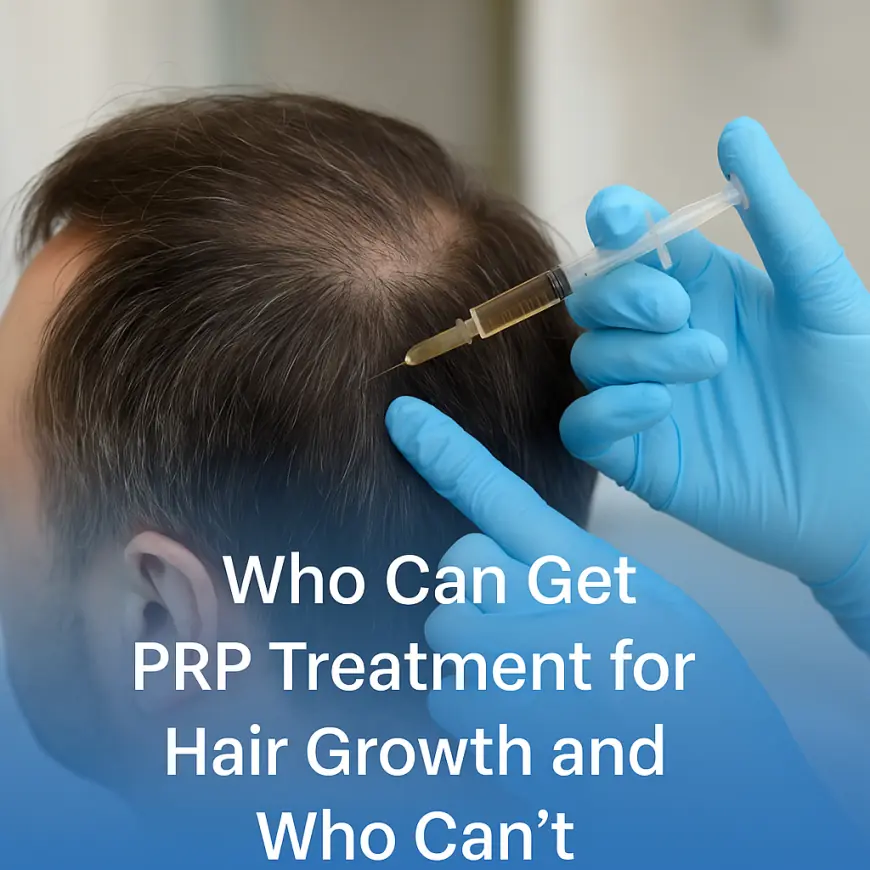Who Can Get PRP Behandeling for Hair Growth and Who Can’t
Not every person who is losing hair is a good candidate for PRP behandeling. The effectiveness depends on a number of circumstances. Read more here.

In the Netherlands, hair loss begins as early as puberty and affects more than 10 million men and 20 million women. By the age of fifty, 40% of women and fifty percent of males will have notable loss.
Genetic, environmental, hormonal, autoimmune, stress, drug, and pregnancy variables are usually among the causes. The likelihood of alopecia (hair loss) is frequently exacerbated by a combination of factors.
Fortunately, noninvasive procedures like PRP Behandeling are offering quicker and simpler methods to promote natural hair growth over time.
Platelet-Rich Plasma Therapy: What Is It?
Our blood's platelets serve as clotting cells, but they are also loaded with growth and healing factors that help damaged muscle, tendon, and ligament stem cells begin the mending process.
The body's natural ability to heal and renew is strengthened by the many growth factors and cytokines found in PRP. In essence, PRP therapy accelerates the body's natural processes.
The patient's blood is drawn, and the platelets are separated from the other components of the blood in a centrifuge. When used to treat trauma and injuries, the platelet-rich plasma is injected into the damaged tissue to promote the body's natural healing process.
PRP contains high levels of more than 20 growth factors, several of which are believed to promote hair growth. PRP seems to provide essential growth elements to hair follicles, transforming them from a dormant state where hair is not growing to an active state where a normal hair development cycle takes place.
Who Is the Good Candidate for PRP Therapy?
Not every person who is losing hair is a good candidate for PRP treatment. The effectiveness of this treatment depends on a number of circumstances, so it's critical to speak with a professional to determine your appropriateness.
Here are the main factors that can help you decide if PRP hair treatment is right for you below:
-
People Who Are Losing Hair in the Early Stages
People who have mild to moderate hair loss or are in the early stages of hair thinning are the greatest candidates for PRP injections.
The hair follicles are still somewhat functioning at these stages, and PRP therapy can encourage them to become more active and generate new hair. The more quickly you detect hair loss, the more effective the treatment will be.
-
People Affected by Androgenetic Alopecia (Baldness In Either The Male or Female Pattern)
One of the most prevalent causes of hair loss is androgenetic alopecia, also referred to as male or female pattern baldness.
Hair thinning occurs gradually as a result of this disorder, which causes the hair follicles to decrease over time. PRP therapy is usually a fantastic option for people with this kind of hair loss.
PRP injections can help enhance hair density and slow down the course of androgenetic alopecia since they infuse growth factors directly into the scalp.
PRP can considerably slow down the rate of hair thinning and even promote new growth in dormant follicles, even if it might not be able to totally reverse this kind of hair loss.
-
People Seeking a Natural, Non-Surgical Approach
PRP hair treatment offers a natural, non-surgical alternative for people who choose to stay away from surgery or more intrusive procedures.
The procedure is a safe and natural way to promote hair growth because it uses your own blood, which reduces the possibility of allergic reactions or rejection.
4. Individuals Who Have Not Yet Attained Total Baldness
People who are totally bald or whose hair follicles are dormant are not candidates for PRP therapy.
PRP therapy cannot regrow hair follicles that have already died in cases of complete baldness. Therefore, the treatment might not be beneficial for those with extensive hair loss.
-
Applicants who Lead Healthier Lives
The ideal candidates for PRP therapy are those who maintain a healthy lifestyle. The efficiency of the treatment might be greatly influenced by your general health because it depends on the mending abilities of your own platelets and growth factors.
-
People Who Are Amenable to Several Therapy Sessions
PRP therapy is a continuous process. To get the best effects, several sessions are needed, usually spread out over several months.
In order to maintain the effects, a standard treatment schedule can include three sessions spaced four to six weeks apart, followed by maintenance treatments every six to twelve months.
-
Individuals Seeking Results That Appear Natural
PRP therapy might not be the best choice for you if you want a spectacular, instant hair restoration. As the growth factors and stem cells function to rebuild hair follicles, the effects of PRP treatment appear gradually over time.
Who Should Get PRP Treatment?
If you suffer from specific medical conditions, such as blood clotting or bleeding issues, you might not be a good candidate for hair restoration.
If you have an active skin problem or an infection on your scalp during therapy, you should avoid getting PRP injections. Hence, before beginning therapy, your dermatologist will assist you in discussing any illnesses or worries.
What's Your Reaction?
 Like
0
Like
0
 Dislike
0
Dislike
0
 Love
0
Love
0
 Funny
0
Funny
0
 Angry
0
Angry
0
 Sad
0
Sad
0
 Wow
0
Wow
0


















































